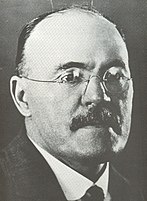New South Wales state election, 1930
|
|
||||||||||||||||||||||||||||||||||
|---|---|---|---|---|---|---|---|---|---|---|---|---|---|---|---|---|---|---|---|---|---|---|---|---|---|---|---|---|---|---|---|---|---|---|
|
||||||||||||||||||||||||||||||||||
|
All 90 seats in the New South Wales Legislative Assembly 46 Assembly seats were needed for a majority |
||||||||||||||||||||||||||||||||||
|
||||||||||||||||||||||||||||||||||

Legislative Assembly after the election
|
||||||||||||||||||||||||||||||||||
|
||||||||||||||||||||||||||||||||||
Thomas Bavin
Nationalist/Country coalition
The 1930 New South Wales state election was held on 25 October 1930. The election was conducted in single member constituencies with compulsory preferential voting. The election occurred at the height of the Great Depression and was a landslide victory for the expansionary monetary policies of Jack Lang.
As a result of the election, the Nationalist/Country Party coalition government of Thomas Bavin and Ernest Buttenshaw was defeated and the Labor party, led by Jack Lang, formed government with a parliamentary majority of 20. The Parliament first met on 25 November 1930, and had a maximum term of 3 years. However it was dissolved after only 18 months on 18 May 1932 when the Governor, Sir Philip Game dismissed the Premier Jack Lang and commissioned Bertram Stevens to form a caretaker government. Thomas Bavin was the Leader of the Opposition until 5 April 1932 when he was replaced by Bertram Stevens. Michael Bruxner replaced Buttenshaw as leader of the Country Party in early 1932.
...
Wikipedia


